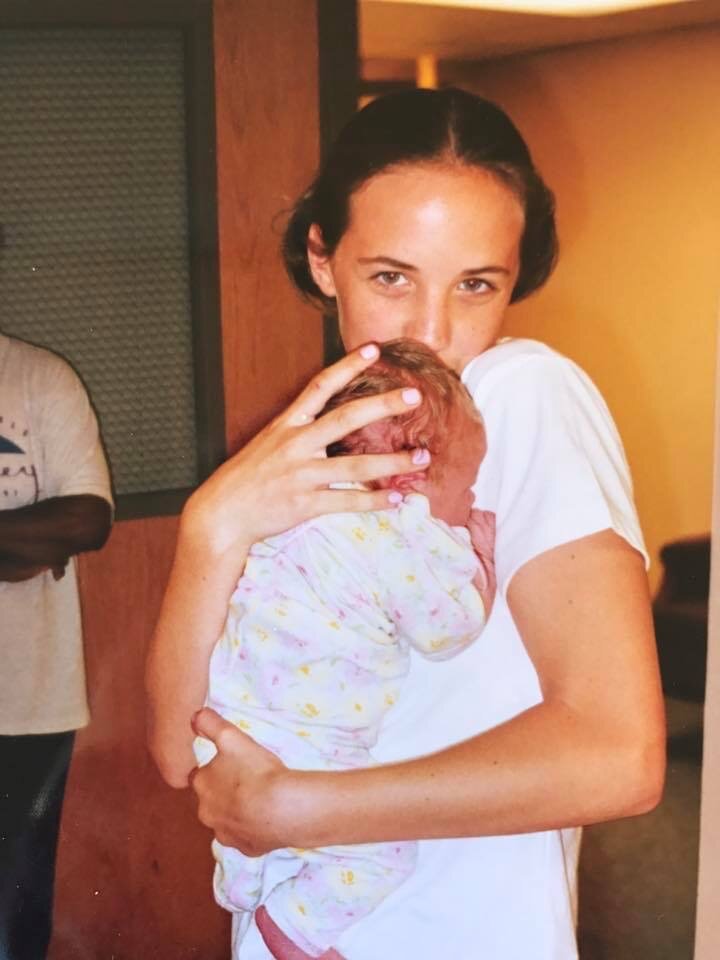Story by Parker Johnson. Photos courtesy of Sally Long Conway.
Losing a loved one to suicide is always devastating. Over the last ten years, the rate of suicides in the United States has increased by 70% for children between the ages of 10 and 17. This massive increase has now raised suicide to the second leading cause of death for individuals between the age of 10 and 34. When someone of such a young age takes their own life, it rips a hole through their family and the surrounding community.

Sally, her sister Abby, and mother Sue in 2018.
However, many families who have found themselves on the other side of suicide are able to channel their grief and use the experience to create change for others. These families use their experience to help prevent and guide others from going through this overwhelming trauma. This is the path that the Loncar family chose. In late 2016, Grace Loncar, a bright young girl of the age of 16, brought an end to her own life. The resulting aftermath would prove disastrous for the Loncar family. A week after Grace died by suicide, her father, Brian Loncar, died of an accidental overdose.
While these two events would bring any family to their knees, Grace’s sister Sally Long Conway, along with the rest of her family, felt that they owed it to Grace’s memory to ensure that no other family experienced the same trauma. That is why Sally helped form The Grace Loncar Foundation and now serves as Executive Director. “Our foundation focuses on three key things—Awareness, Prevention, and Scholarship.” Using these three principles The Grace Loncar Foundation strives to provide help to the kids and young adults in the Park Cities community.
Awareness is, by far, one of the most essential elements of fighting mental illness and the threat of suicide. “Although progress has been made, so much stigma still resides in our society around these issues,” Sally explains. “Stigma is lethal, because it prevents individuals from getting the help that they need and is available. How we address stigma is through awareness and education. It is letting people know they are not alone in the struggle, and that their struggle is not a personality defect or character flaw. Depression and anxiety, like so many other mental illnesses are diagnosable medical conditions of the brain, and should be treated with the same urgency and compassion as we do other diseases.”
Another way that The Grace Loncar Foundation is spreading awareness is through sponsoring educational series and speakers on the topic of mental health and suicide. “It is imperative that we educate on the warning signs of suicide and mental distress. Suicide is 100% preventable. Most people want to help, but may not know how to identify or reach out to someone struggling.” The Grace Loncar Foundation has teamed up with local mental health professionals and this past year conducted a speaking series with the sororities at Southern Methodist University. Plans have been made for a presentation with the YMCA of Metropolitan Dallas this coming fall, but the ongoing pandemic of Covid-19 has complicated organizing public gatherings.
While awareness plays an important role, it is only half the battle in fighting mental illness and suicide. Next, you need to establish strong prevention tools and programs to help protect the kids who struggle with depression and other mental illnesses. One way The Grace Loncar Foundation is developing prevention programs in the Highland Park community is by partnering with the renowned Hope Squad program that was made famous in Utah.
“Since our primary focus is fighting mental illness in kids and young adults in high school, we wanted to establish a specifically designed program for them. What we have found is if a student has issues with mental illness, they rarely, if ever, go to the teacher for help. Often, students will go to fellow students when seeking help. The problem with students going to other students is kids, and young adults do not have the proper tools and education to deal with mental illness related issues. What we know is that students and young adults are already having conversations around these issues but we have not provided them the necessary tools or education on how to handle or cope with these heavy topics. Hope Squad gives the tools and education necessary for students to locate individuals who are struggling with mental illness. The students chosen for Hope Squad do not provide any counseling. Instead, they are trained to locate troubled students and point them to an adult who can get them help.”
Sally, holding her newborn sister, Grace.
The next step in fighting mental illness and the threat of suicide is finding a way to encourage students and young adults to look towards a brighter future. “We want young adults to choose life,” says Sally. “We want to provide support to students as they pursue their dreams and passions, because finding purpose is certainly combative to suicide.”
A condition of the scholarship requires volunteer hours with a mental health non-profit. Not only incentivizing students to contribute to their own future but also to the greater cause of awareness and prevention within their community. It also allows The Grace Loncar Foundation an avenue to support other local non-profits. “There are some really great organizations in Dallas, doing wonderful work on behalf of mental health,” says Sally. “We would love to be able to write a check to each one, however that is not feasible. But we can send student volunteers through our scholarship program. It’s a small gesture of wanting to unite all our efforts for the greatest impact.”
With the recent health pandemic of COVID-19, mental health organizations like The Grace Loncar Foundation rely on donations to continue the incredible work they do for the Dallas Community. If the story of Grace Loncar and her sister Sally Long Conway inspires you, we encourage you to donate to help fight the war against mental illness. Even if you cannot give, we encourage you to reach out to family members or friends who are struggling and show them that they are not alone. It is okay not to be okay.
If you or someone you know is experiencing a mental health crisis or suicidal thoughts, please dial 1-800-273-8255 for the National Suicide Prevention Lifeline or text TALK at 741741. For help finding a mental health resource, call the Here for Texas Mental Health Navigation Line at 972-525-8181.

